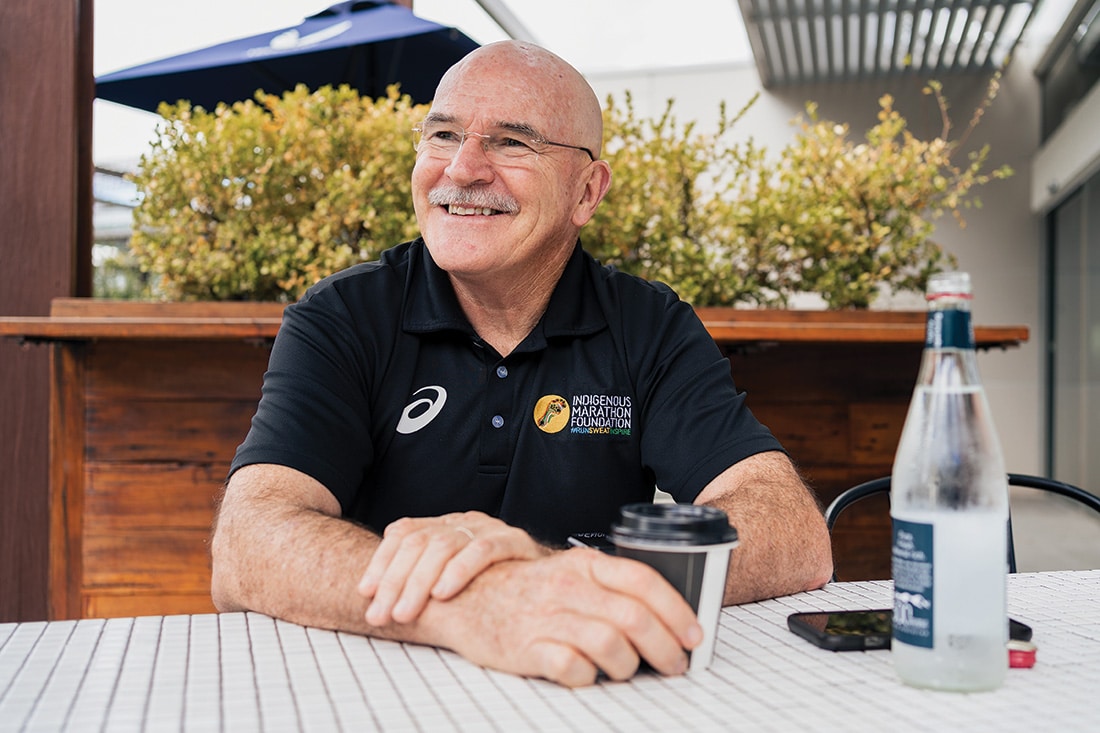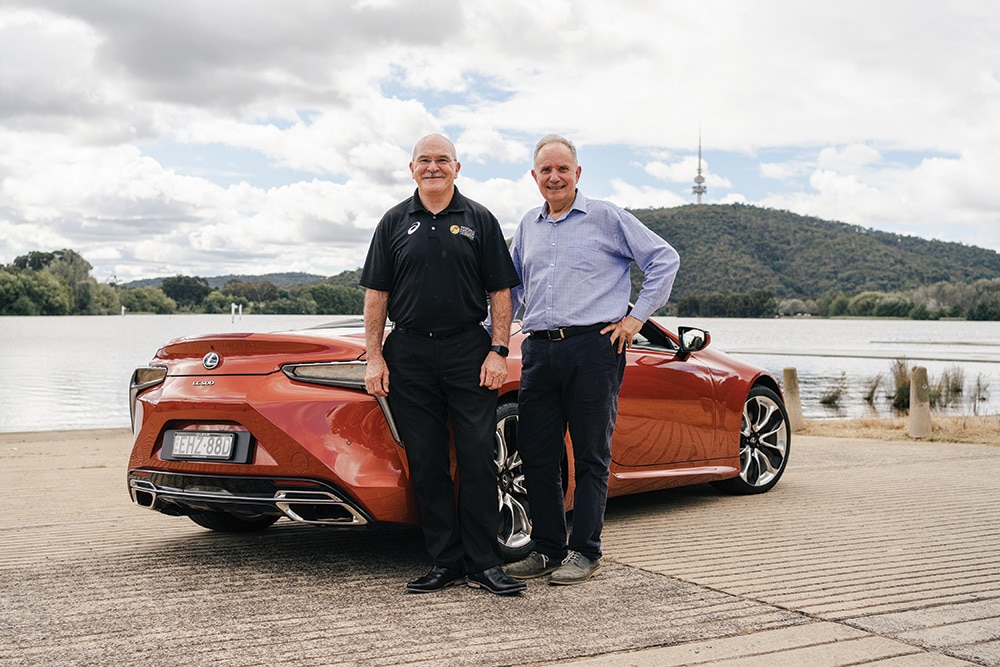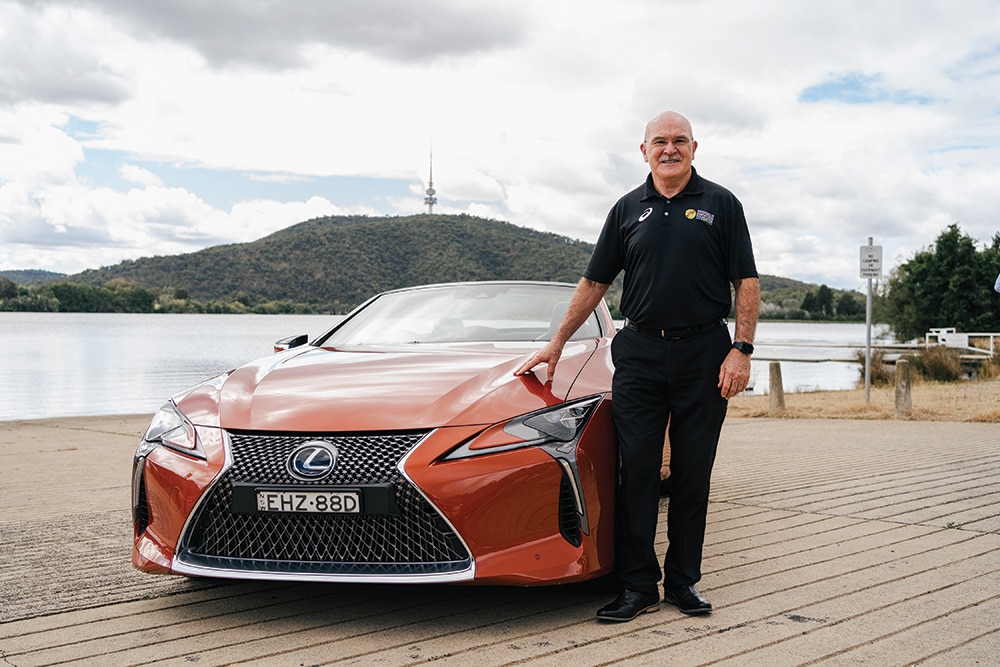As a connoisseur of fast cars, long-distance running legend Rob de Castella (aka Deek) was blown away when he laid eyes on the set of wheels I’ve arranged for us to go and get coffee in.
As I pull up, the park directly outside the doors of the Indigenous Marathon Foundation’s (IMF) Phillip office was wide open. Meeting him in the foyer, I made sure he led the way outside.
“Oh, cool,” he said, after a moment’s pause.
He then carefully inspects the blazing carnelian paintjob that accentuates the striking silhouette and exterior design of today’s chariot, the Lexus LC 500 convertible, supplied by my good friend Mikkel Litonjua, Lexus of Canberra general manager.
Introduced in late 2020, the LC 500 convertible effortlessly blends performance, comfort, and cool. I think of it as the sophisticated Canberran’s convertible.
Deek is the first person I called for a coffee and a chat for the 2022 launch of Canberrans in Cars Getting Coffee. (Shamelessly) inspired by the Jerry Seinfeld web series, the plan is to go deep with some of the capital’s most prominent and inspiring people.
Deek became a household name in the 1980s as a world champion marathon runner. Since winding up his prodigious athletic career in 1993, he’s gone on to dedicate himself to community service here in Canberra, first through the AIS and SmartStart for kids, then IMF and Deek’s Health Foods.
today’s chariot, the Lexus LC 500 convertible, supplied by my good friend Mikkel Litonjua, Lexus of Canberra general manager
Born and raised in Melbourne, he attributes his upbringing and family for his success; they created an environment where he felt nurtured and “destined to do great things”.
“It was not just an entitlement, but almost predestined for me to achieve something of significance,” he said. “So, success sat comfortably with me, unlike some people who feel out of place.”
Growing up as a “rascal” who got up to “a lot of mischief, as we all did”, Deek first got serious about his training aged 17 with coach Pat Clohessy; he remained dedicated throughout his athletic career that lasted till his mid-30s.
“My athletic career, while I was representing Australia, was a relatively selfish period of my life. I dedicated myself to being the best I could possibly be and along the way lost a marriage, probably because of my fanaticism toward my training and fixation on what I needed to do,” he said.
A role at the Australian Institute of Sport’s (AIS) sports science and sports medicine department first brought him to Canberra.
He was then appointed AIS director in 1990, a role he held until 1995.
“Trying to work in that high performance space was an amazing chance to spend time with our amazing head coaches at the AIS here, they’re just amazing people,” he said.
Having lived here for over 30 years, Deek loves Canberra and proudly calls it home.
“I love the access to the mountains and bush, I love the fact we can get around easy, it’s a short flight to Sydney and Melbourne.
“As far as I’m concerned, it’s very central.”
‘Never been a more important time to look after your health’

Having dedicated his life to health, wellbeing, fitness, and athletics, it’s little surprise Deek talked about this at length over coffee.
“There has never been a more important time for us as a community to look after our health,” he said.
“The basic things like healthy nutrition, regular exercise, and managing your stress … is more important now than ever before for us to make our health and wellbeing one of the highest priorities in our lives.”
From a diet perspective, Deek is big on consuming ancestral diets of meats, vegetables, nuts, eggs, and high-protein, high-animal-fat food, moving away from highly processed foods, grains, crops and cereals.
“I’m a big fan of encouraging vegetarian diets … I reckon the more people about we have eating vegetarian, it means there’s more meat for the rest of us,” he smiled.
“It’s the same with physical activity; we need to move.
“You’ve got people falling and breaking bones because they have osteoporosis because they’re not doing the weight-bearing exercises and their diets are crap.”
There has never been a more important time for us as a community to look after our health.
Rob de Castella
Those very principles flow through his work: the IMF provides an avenue for exercise, addresses chronic disease, and instils a sense of pride and self-worth within Aboriginal and First Nations people.
“For me, it’s a privilege to spend the last decade or more with our First Nations peoples, travelling to remote communities and listening to stories, but it’s been a tragedy to see the infiltration of sugary drinks and junk food out there in remote communities,” he said.
Inspired to showcase and celebrate our First Nations people as “a national treasure”, Deek’s work through the IMF also looks to foster Indigenous culture across the country.
“Ensuring that the elders understand and pass on their learnings, law, messages and language to the next generation of leaders coming through is vitally important,” he said. “We’re endeavouring to create some amazing leaders and champions.”
Now into their 13th year, the IMF uses marathon running to change lives by promoting healthy and active lifestyles throughout Indigenous communities. The Foundation has had 122 Indigenous and First Nations Australians graduate through their program, all of whom continue to receive support.
“The Foundation is going well. It’s been a tough year for our programs because there’s been no trips overseas, we haven’t been able to take graduates or a squad to the New York Marathon,” Deek said.
Instead of making their annual pilgrimage to New York due to pandemic restrictions, last year the IMF hosted a marathon at midnight under a full moon in the desert outside Alice Springs on Arrernte Land.
“That was an incredibly powerful and spiritual experience for our squad, so we adapted, and that’s what we all have to do,” he said. “We have to stay resilient, stay positive, and keep on pushing forward.”
In 2005, the champion athlete established Deek’s Health Foods to provide an opportunity for people who want to be healthier and want an alternative to high-carb, high-grain diets.
“It’s really important people understand that what you eat not just affects how you feel and how you look, but also the way you cope with a whole range of health issues you’re exposed to,” he said.
“People need to take more responsibility for your health. We live these days far too often where we divest our responsibility to others … We need to take responsibility for maintaining our health and wellbeing and make good choices.”

The Lexus LC 500 Convertible I’m driving is a 5-Litre V8. The LC 500 is also available as a 3.5-Litre hybrid and 5-Litre V8 coupe.
To test drive the LC 500 for yourself, call Lexus of Canberra on 6222 1888.
For more information on sponsored partnerships, click here.



